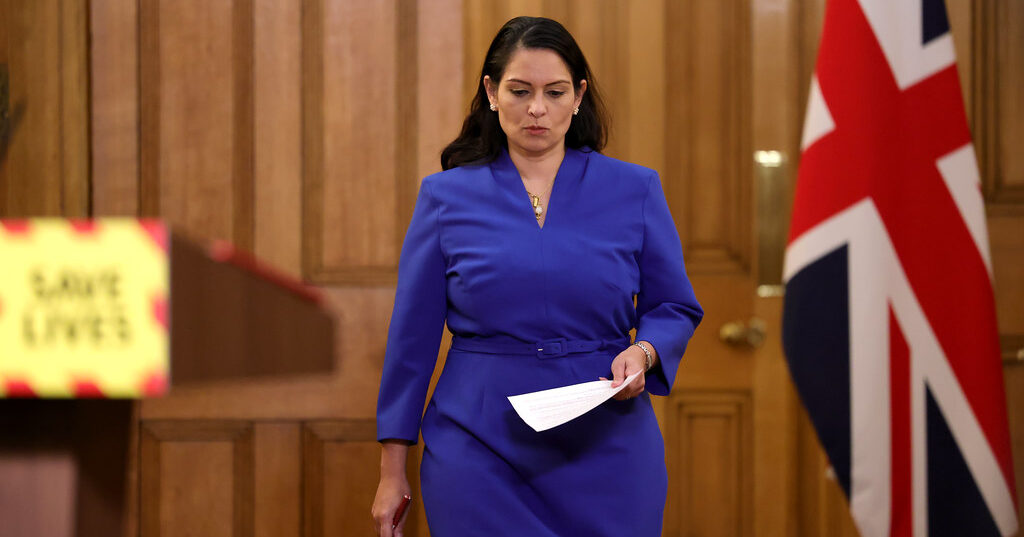

By Alex Rutherford
The deal between Britain and Rwanda, under which the UK would pay the Rwandan government to accept its unwanted asylum seekers, has rightly caused outrage and condemnation by the media, politicians and even the UN refugee agency.
The deal, announced on 14 April, involves an initial £120m cash payment to Rwanda in exchange for accepting ‘tens of thousands’ of asylum seekers who attempt to enter Britain by crossing the Channel.
The Memorandum of Understanding is thinly cloaked in high-minded rhetoric about the protection of ‘human rights’, saving lives caused by ‘illegal crossings’, and ‘breaking the business model of human traffickers’. In reality the deal allows the UK, one of the richest countries in the world, to offload unwanted human beings on one of the poorest.
The deal has been criticised primarily as inhumane, unworkable and a waste of public money. What is missing from these criticisms, however, is an analysis of the global system which allows rich and powerful nations to offload their supposed ‘international obligations’ onto poorer countries: imperialism.
The timing of the announcement is certainly convenient for Johnson, mired in lockdown controversy; the idea of exporting refugees to Rwanda is red meat for the Tories’ racist base. But this deal is no mere ruse to distract attention.
Home Secretary Priti Patel has already visited the facilities, which have been constructed in Rwanda to accommodate the transferred refugees. Although the deportations will cost £30,000 a head, making them almost unworkable, this should by no means be assumed. The British working class must be on guard to protect its international brothers and sisters against this racist and inhumane treatment.
Additionally, many of the refugees the government are proposing to transfer to Rwanda have been displaced as a direct consequence of war, poverty and climate-induced disasters. The deal reflects the heartless attitude of the imperialists towards their own victims. Undoubtedly African, Asian and Arab asylum seekers will be chosen for this mad experiment: human trafficking at its worst.
Rwanda and imperialism
To understand the deal it is important to bear in mind the utter contrast between Britain and Rwanda. The UK is the fifth largest economy in the world, reaping profits from all four corners of the globe. Its huge mass of monopoly and finance capital allows it to act as one of a handful of robber nations, taking raw materials and exploiting cheap labour from the rest of the world, leaving other nations in debt and underdeveloped.
Rwanda’s economy is based primarily on agriculture, both for subsistence and cash crops (primarily tea and coffee) to be exported abroad. The average age of the population is just 19 years of age, and average life expectancy in 2021 was only 65 years, compared to an average age of 40.5 years and an average life expectancy of 81 years in the UK. Currently, only 70% of Rwandan households have access to electricity.
Even the infamous rivalry between the Tutsi and Hutu peoples, which led to the massacre of one million Tutsis in 1994, was a product of European colonialism. Rwanda was initially colonised by Germany in 1884 until invaded by Belgium in 1916. While both colonial powers perpetuated a pro-Tutsi policy, Belgium used far more direct colonial methods, including the introduction of identity cards in 1935, labelling each member of the population as a member of their specific ethnic group. This cemented ethnic antagonisms between the oppressed Hutu majority and the privileged Tutsi minority – while it had previously been possible for a Hutu to be made an ‘honorary Tutsi’, this was now no longer possible.
While a Hutu revolt in 1959 established a Hutu-led republic in 1962, Rwanda remained reliant on global imperialism to maintain its economy through foreign capital investment, the need to import industrial products to maintain agricultural production, and ‘loans’ that come with significant strings attached.
Authoritarian
Paul Kagame has led a Tutsi-dominated government as president since 2000, but effectively ever since his RPF guerrillas ousted the genocidal Hutu regime in 1994. He is, however, no less subservient to the interests of foreign capital, as evidenced by this disgraceful deal.
Although since the genocide Rwanda has been considered a relatively stable economy in comparison to other African countries, this has come at a significant cost for the population in terms of political freedom. A previous two-term limit for presidencies was repealed in 2015, and the current president-dictator Paul Kagame was re-elected for a third seven-year term in 2017, with 98.79% of the vote.
Opposition parties are heavily restricted and, according to Human Rights Watch, these laws effectively make Rwanda a one-party state: ‘under the guise of preventing another genocide, the government displays a marked intolerance of the most basic forms of dissent’, including illegal and arbitrary detention, threats or other forms of intimidation, disappearances, politically motivated trials, and the massacre of peacefully protesting civilians.
In this context, the suggestion that Rwanda represents a safe haven for traumatised asylum seekers rings somewhat hollow. It is frankly absurd to suggest that refugees will be transferred to Rwanda from the UK for their own benefit. Clearly this is an attempt to shift responsibility for these migrants from a rich country to a poor one, primarily for the sake of appealing to the Tories’ rabid right wing base. The working class in Britain must unite against this disgusting and racist plan, building towards a mass mobilisation in defence of refugees and all migrants seeking a better life.